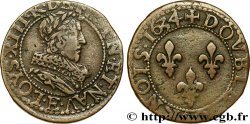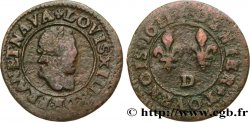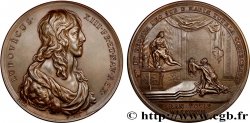fme_860809 - LOUIS XIII Médaille du Val-de-Grâce, naissance de Louis XIV, refrappe
200.00 €(Approx. 228.00$ | 172.00£)
Quantity
Add to your cart

Type : Médaille du Val-de-Grâce, naissance de Louis XIV, refrappe
Date: 1638
Mint name / Town : 75 - Paris
Metal : bronze
Diameter : 69,5 mm
Orientation dies : 12 h.
Engraver MOLART Michel (1641-1713)
Weight : 117,78 g.
Edge : lisse
Puncheon : sans poinçon
Coments on the condition:
Patine hétérogène; Présence de coups et rayures
Obverse
Obverse legend : LVDOVICUS. XIII. FR. ET. NAV. REX..
Obverse description : Buste à l’antique de Louis XIII avec la léonté sur l’épaule.
Reverse
Reverse legend : OB GRATIAM DIV DESI. DERATI REGII PARTVS // V. SEPT. M. DC-XXXVIII / .
Reverse description : Portail et façade de l’Église du Val de Grâce.
Commentary
Reproduction avec les même coins (avec la cassure bien visible au revers) que l’exemplaire de la collection Weiss.
Michel Mollart est un graveur de médaille né et mort à Dieppe (1641-1713), également épelé Mollard, Molart, Molard ou Molar... Appelé vers 1677 à Paris, avec son compatriote Jean Mauger (1648 - 1712), par Louvois, il grava l’histoire entière du roi Louis XIV. Cet ouvrage estimé des savants fut si agréable à ce prince qu’il permit à l’auteur de s’en réserver et approprier le double, ce qui n’avait jamais été accordé à personne.
Il avait fait deux Christs de bronze qui passaient pour des chefs-d’œuvre. L’un fut demandé par la ville de Dieppe pour en faire un présent, mais parce qu’au lieu de lui donner 2 000 livres comme il le demandait, celle-ci ne lui en offrait que 1 500, Mollart le brisa en présence de ceux qui lui apportaient cette offre en leur disant qu’ils n’étaient pas dignes d’avoir des ouvrages de sa façon.
Louis XIV, dit Louis le Grand ou le Roi-Soleil, né le 5 septembre 16382 au Château Neuf de Saint-Germain-en-Laye et mort le 1er septembre 1715 à Versailles, est un roi de France et de Navarre qui régna du 14 mai 1643 à sa mort..
Michel Mollart est un graveur de médaille né et mort à Dieppe (1641-1713), également épelé Mollard, Molart, Molard ou Molar... Appelé vers 1677 à Paris, avec son compatriote Jean Mauger (1648 - 1712), par Louvois, il grava l’histoire entière du roi Louis XIV. Cet ouvrage estimé des savants fut si agréable à ce prince qu’il permit à l’auteur de s’en réserver et approprier le double, ce qui n’avait jamais été accordé à personne.
Il avait fait deux Christs de bronze qui passaient pour des chefs-d’œuvre. L’un fut demandé par la ville de Dieppe pour en faire un présent, mais parce qu’au lieu de lui donner 2 000 livres comme il le demandait, celle-ci ne lui en offrait que 1 500, Mollart le brisa en présence de ceux qui lui apportaient cette offre en leur disant qu’ils n’étaient pas dignes d’avoir des ouvrages de sa façon.
Louis XIV, dit Louis le Grand ou le Roi-Soleil, né le 5 septembre 16382 au Château Neuf de Saint-Germain-en-Laye et mort le 1er septembre 1715 à Versailles, est un roi de France et de Navarre qui régna du 14 mai 1643 à sa mort..








 Report a mistake
Report a mistake Print the page
Print the page Share my selection
Share my selection Ask a question
Ask a question Consign / sell
Consign / sell
 Full data
Full data










